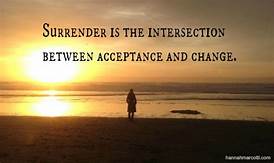Author: mysticheartsong
What Does It Mean To Surrender? – Eckhart Tolle
 “Surrender each moment to the reality of that moment knowing that what is cannot be undone — because it already is — you say ‘yes’ to what is or accept what isn’t. Then you do what you have to do, whatever the situation requires. If you abide in this state of acceptance, you create no more negativity, no more suffering, no more unhappiness. You then live in a state of nonresistance, a state of grace and lightness, free of struggle.
“Surrender each moment to the reality of that moment knowing that what is cannot be undone — because it already is — you say ‘yes’ to what is or accept what isn’t. Then you do what you have to do, whatever the situation requires. If you abide in this state of acceptance, you create no more negativity, no more suffering, no more unhappiness. You then live in a state of nonresistance, a state of grace and lightness, free of struggle.
Nonresistance doesn’t necessarily mean doing nothing. All it means is that any ‘doing’ becomes nonreactive. Remember the deep wisdom underlying the practice of Eastern martial arts: Don’t resist the opponent’s force. Yield to overcome.
The ego believes that in your resistance lies your strength, whereas in truth resistance cuts you off from Being, the only place of true power. Resistance is weakness and fear masquerading as strength. What the ego sees as weakness is your Being in its purity, innocence, and power. What it sees as strength is weakness. So the ego exists in a continuous resistance-mode and plays counterfeit roles to cover up your ‘weakness,’ which in truth is your power.

Until there is surrender, unconscious role-playing constitutes a large part of human interaction. In surrender, you no longer need ego defenses and false masks.
You become very simple, very real. ‘That’s dangerous,’ says the ego. ‘You’ll get hurt. You’ll become vulnerable.’ What the ego doesn’t know, of course, is that only through the letting go of resistance, through becoming ‘vulnerable,’ can you discover your true and essential invulnerability.”
“The Power of Now,” Eckhart Tolle, page 215-221.
Lighten Up
 you think it’s time for you to lighten up and start having more fun with all of this, and accept that you are Eternal Beings? And since you are Eternal Beings, then there’s no point in rushing, because there’s never going to be a time when you don’t exist.”
you think it’s time for you to lighten up and start having more fun with all of this, and accept that you are Eternal Beings? And since you are Eternal Beings, then there’s no point in rushing, because there’s never going to be a time when you don’t exist.”
7 Chakras Healing Chants for Meditation
Reincarnation Proved
Dr. Brian L Wiess, author of “Many Lives, Many Masters,” and Oprah Winfrey discuss death, reincarnation, the soul and prayer on Super Soul Sunday.
3 Keys To A “Good” Fight With Your Spouse

Married fights can be tricky. They start out about something benign, like how generous the pile of fried onions should be on the top of green bean casserole or what’s the best way to get to the Flatiron Building from the George Washington Bridge, and the next thing you know you’re airing out age-old quarrels that neither of you realized the other was still carrying around (“And three years ago on Christmas, you let your brother say that horrible thing about me!”). Keep disputes focused; don’t take current behavior and start extrapolating larger trends in the relationship because, in the moment, it might seem like a good idea to “get them out in the open” and “hash them out.” Such leaps are dangerous, and they’re dirty pool. When we lawyers are cross-examining even the skankiest people, we’re restricted from jumping from the heinous behavior in question to other heinous acts not on the docket. If you’re fighting about a specific issue, stick to that issue. You can bring up the old stuff later, after you’ve worked this one through and are both in a calmer state of mind. Or you may realize, in the interim, that it’s best to let sleeping dogs lie. You are surely aware that you can never unsay things you say in arguments. You can apologize, but that doesn’t take it back. To test this theory: Take a plate; throw it on the ground; now apologize to it. See what I mean?

2. Identify the subject.
If you’re arguing about a specific issue as an example of a larger pattern of behavior, focus the discussion on the larger pattern of behavior. (This may sound like the opposite of the previous point; I don’t believe it is.) You’re not mad that your spouse deleted the program you wanted to watch from the DVR after he finished it. Well, you are, but that’s not what upsets you: It’s that he was thinking only about himself in that moment and not thinking about what you might want. Of course that’s the key issue—because, let’s face it, if the DVR incident was the first time he ever did something like that, you wouldn’t be ready to bite his head off. You’d shrug it off. “It was an honest mistake,” or “Things happen.” But you didn’t, because it’s part of a larger body of disagreeable behavior. So, get to that general principle first, and use the individual incident (or incidents) as supporting “evidence.” Trial Lawyer says: Lead with the big picture and then provide the testimony and evidence to back it up.
If you married a guy who is short, don’t argue with him about how much better it would be if he were taller. The argument is not going to end well. If you’re arguing about something that’s happened and can’t be undone without the aid of a time machine, really make sure it’s worth having the argument. Sure, there are times when your spouse did or said something stupid and they’re likely to do it or say it again if the behavior is left unchecked. In those circumstances, it might be worth having the argument. The same is true if the behavior is indicative of a larger pattern (such as selfishness, rotten investment skills, an upsetting approach to parenting) that might come up again in different circumstances. If you’re just holding a grudge and upset with your spouse about something unrelated and it’s impossible to change or undo, tread lightly. We remember the complaints more vividly than the compliments. I would know: I listen to recollections of marital histories for hours and hours, 50 weeks of the year.”
Feel Proud of Who You Are ∞The 9th Dimensional Arcturian Council
 “Greetings. We are the Arcturian Council. We are pleased to connect with all of you.
“Greetings. We are the Arcturian Council. We are pleased to connect with all of you.
We are so very proud of each of you, and we want very much for you to feel pride as well. We want you to feel that pride, not because of an accomplishment, but because of the recognition of who you are. You don’t need a reason to feel good about who you are. You don’t need to give yourselves a performance review. You deserve to feel good about yourselves because you are there, facing tremendous challenges on planet Earth, and accessing more of who you are every day.
 You often look at other people and compare yourselves to them, or you look at your goals for yourself, and you compare where you are in relationship to them. And these are the ways in which you determine whether you have any reason at all to feel proud of yourselves. But what if you could access pride that was not egocentric or narcissistic, and definitely not conditional?
You often look at other people and compare yourselves to them, or you look at your goals for yourself, and you compare where you are in relationship to them. And these are the ways in which you determine whether you have any reason at all to feel proud of yourselves. But what if you could access pride that was not egocentric or narcissistic, and definitely not conditional?
What if you could access pride because you are in acknowledgement of who you are? And yes, we recognize that sometimes you forget. Sometimes you come from a very egoic, mind-oriented, and survival-based approach to life, but you have to realize that all of those mechanisms are there to give you a human experience. They don’t take away from the fact that you are Source Energy Beings. You are unconditional love.
If you want to feel good about some aspect of yourself, why not choose those two, instead of how you measure up to others who are working in the same field as you, instead of how much money you make, where you live, what kind of car you drive, and so on? There is so much good within you, and you can feel very good about what is inside of you.
We encourage you to do so. We encourage you to look within for the feeling of who you are. Stop looking outside of yourselves, or for evidence in the physical realm. All the evidence you need is right there, within you, waiting for you to feel it. And when you do, you will have every reason imaginable to feel proud of who you are.
We are the Arcturian Council, and we have enjoyed connecting with you.” danielscranton.com
What If?
 “When you play the What-If? game, look for things that make you feel better. There is never a situation in which there is not a way out—but, out of habit, most people continue to choose the “lack” perspective until they eventually find themselves where it seems that there are no more choices.
“When you play the What-If? game, look for things that make you feel better. There is never a situation in which there is not a way out—but, out of habit, most people continue to choose the “lack” perspective until they eventually find themselves where it seems that there are no more choices.
But as you hold to your intention to look for evidence of Well-Being and thriving and success and happiness, you will tune yourself to the vibrations of those things—and so those kinds of good-feeling experiences will dominate your life.”
Abraham-Hicks, 8/31/08
Abraham Hicks- General Wellbeing Meditation
https://youtu.be/og4B2ZMP-uY




